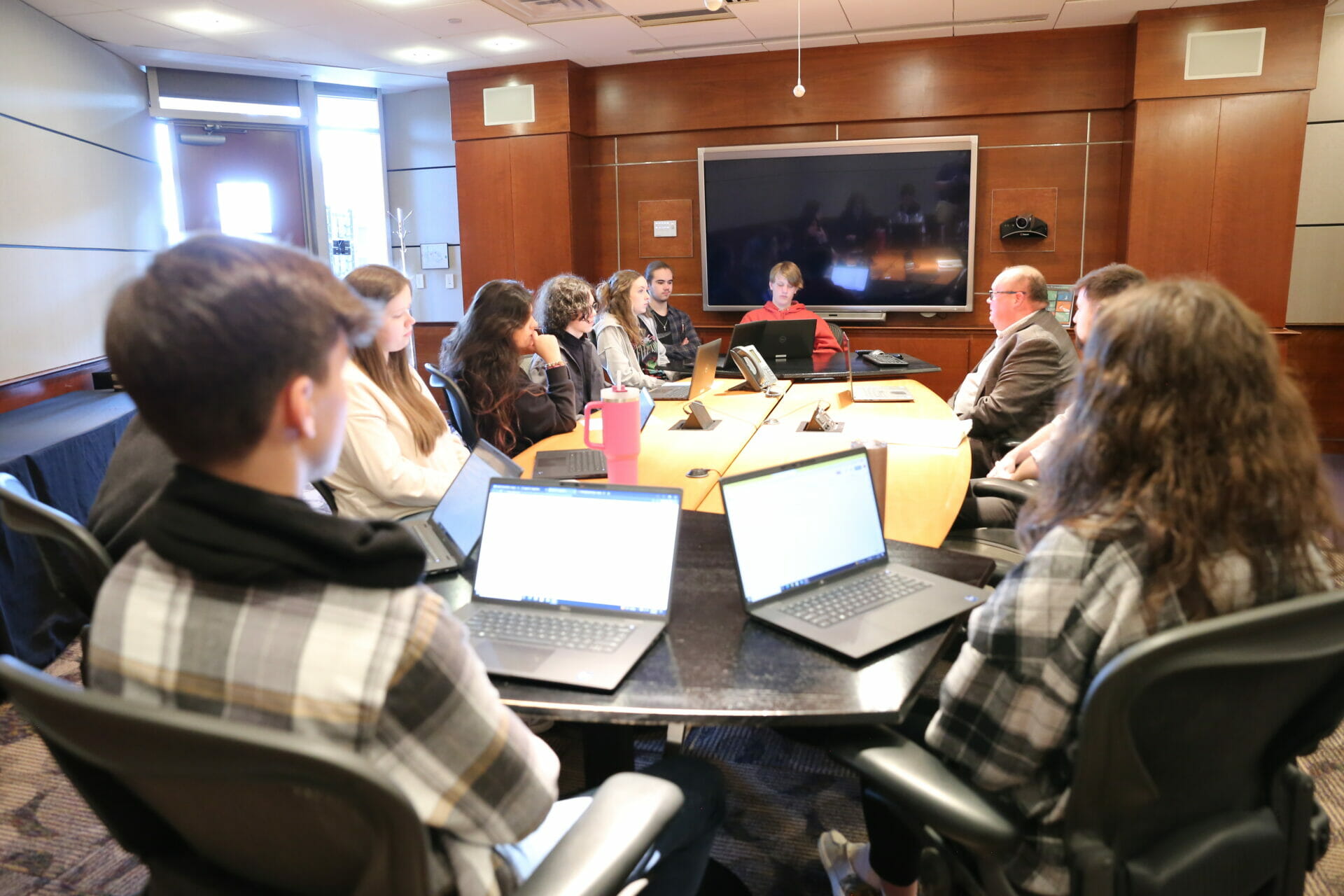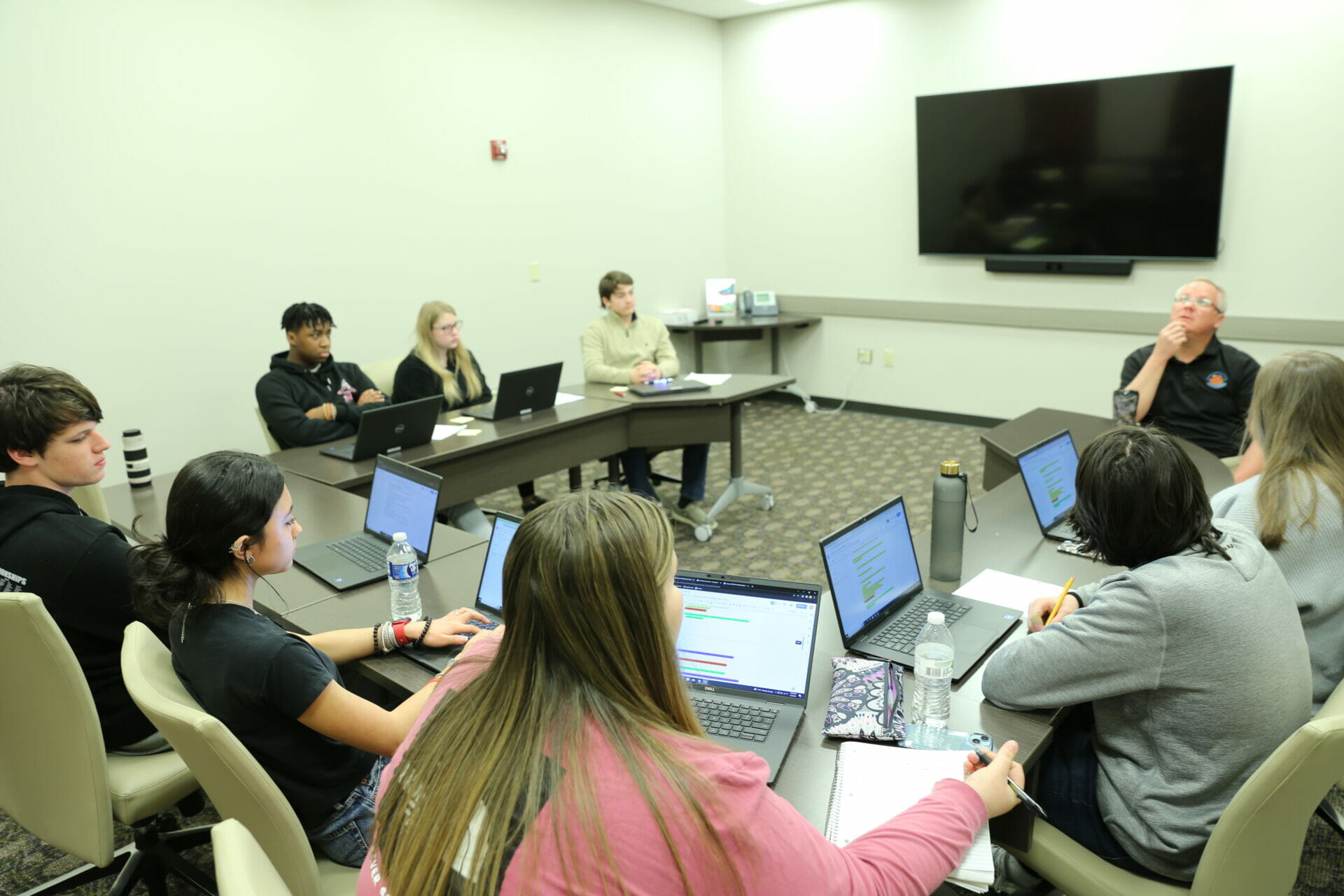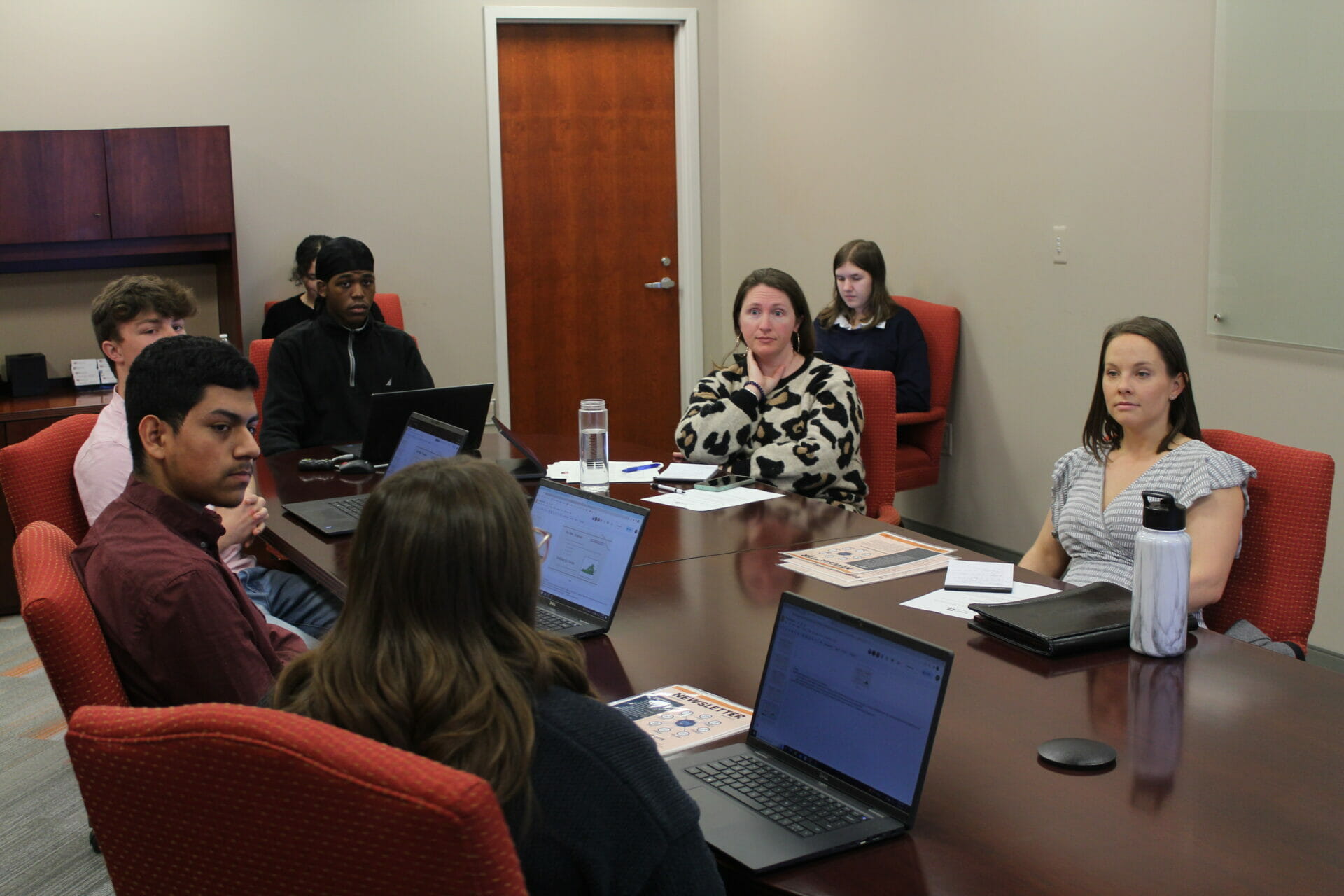
After a month of research and ideating, students present their solutions regarding the adoption of smog-eating billboards to Kegerreis Digital Marketing as part of the NOW teamship program in early April of 2023.
During the month of March, you could find three groups of juniors from the Academy for Engineering and Technology (AET) pouring over data, talking through complex problems and researching new industries throughout the Institute for Advanced Learning and Research (IALR) campus.
One group was busy researching Environmental Protection Agency regulations for pollutants in drinking water. Another was analyzing staffing issues for a science center with inconsistent seasonal attendance trends. The other was exploring how to catalyze widespread adoption of a unique, eco-friendly billboard. On the surface, none of these problems seem like typical course work for high school students.
This was all part of the 2023 cohort in the Next generation Of Work (NOW) teamship program that prepares students for the workforce by allowing them to solve real problems from real businesses with guidance from coaches. This framework was developed by District C – a North Carolina-based nonprofit that is proliferating the model throughout the United States.
Students worked collaboratively and creatively over the course of a month to understand and provide viable solutions for complex problems presented by three unique organizations – including an engineering firm, a marketing company and a museum funded by the Commonwealth of Virginia. With support and coaching from IALR staff, these students from AET learned collaboration and effective problem-solving skills that will benefit them in the workplace.
“The NOW teamship model is about learning the skills and tools necessary to solve messy and complex problems with different people,” said Jessie Vernon, Advanced Learning Program Manager and one of the NOW program coaches. “It makes them think about the actual process that they use to solve the problem more than the problem or solution itself.”
About the Teamship Model
The basis of the NOW program is unique: a business provides an open-ended problem to a group of students who, with guidance from a coach, work together to provide solutions.
“The business partner poses an open-ended problem or question to the students, and then the students work together to solve it,” Vernon said. “Throughout that process, the coach is providing the students tools for successful collaboration and work.”
In this iteration with AET, the students held two meetings with the business to ask questions and learn about the problem, trying to understand any important causes and context and previous efforts to solve it. The student groups met to analyze the problem, research the context and collaborate on potential solutions. After about a month, the students presented their findings and potential solutions to the businesses.
Several IALR staffers became certified coaches with District C in 2019. After completing the training, Advanced Learning Program Managers Jessie Vernon and Dana Silicki and John Hatchett, AET Coordinator who is employed by Danville Community College, have the resources and knowledge to coach groups of students through the process. The first cohort of AET students completed the program completely virtually during the onset of the pandemic in 2020, and the junior class has completed this program in-person every year since then.
Learning to Solve Problems
The primary objective of the teamship experience is to provide two key skills to the student participants: effective collaboration and problem-solving. Students learn to utilize four critical career mindsets – analytical, design, collective and self-aware – to not just solve the problem but understand it in full.
“One of the first tools that they teach is how to properly interview the client that has the problem, how to dig and dig deeper and get down to the nitty gritty of why this is a problem,” said, Lisa Mettler, Work-Based Learning Coordinator for the Southern Virginia Higher Education Center’s Career Tech Academy, who has coached one teamship cycle with students and another with adults, as well as two intensive summer camps.
Through interview sessions with the businesses, research and data analysis, students figured out the problem and its full context – a critical step to be able to offer a solution.

Adam Goebel, Executive Director of the Danville Science Center, meets with a group of students working to provide solutions for staffing difficulties at the museum, through the NOW teamship program.
“It built my problem-solving skills and helped me develop different tools to assist with the problem-solving process,” one student said in the completion survey.
“It allowed you to slow down and actually comprehend the problem instead of just solving it on the spot,” another student said in the completion survey.
Cora Wilson, an AET student who worked on a problem around worker attraction for Comfort Systems USA in the teamship program in 2022, said that participating helped her develop teamwork skills and stronger relationships with her team members.
“This experience allowed me a chance to make a real-world impact in my community and provides a basis for the problem-solving process I will have to go through as an engineer in my future career,” she said.
Businesses Benefitting
While the teamship experience is meant to prepare students for the workplace by providing collaboration and problem-solving skills, the program also provides major benefits for the businesses that participate. With just a five-hour time-commitment, businesses can gain fresh perspectives on difficult problems at no cost, all while helping develop future talent.
For this cohort of students, IALR partnered with organizations: the Danville Science Center, Dewberry and Kegerreis Digital Marketing.
Adam Goebel, Executive Director of the Danville Science Center, provided a complex and industry-wide problem to his team of students. In short, the students explored how to divert and respond to seasonal trends where about 90 percent of group visits come in a six-week period in the spring, which leads to staffing difficulties.
Students provided several possible solutions, a few of which were already being implemented (unbeknownst to the students) and a few of which were operationally or financially unfeasible. Goebel said there are no silver bullet solutions to this industry-wide issue, but he and his team are already exploring how to implement two of the ideas students presented.
“They did a good job thinking outside of the box,” Goebel said. “That’s what impressed me the most, was the fresh eyes and fresh perspective from which they looked at the problem.”
Leslie Mantiply, Associate and Project Manager with Dewberry, provided her group of students a complex problem about new enforceable Environmental Protection Agency regulations regarding treatment limits for PFAS – a chemical commonly found in waterproofing, and plastics known to have health effects. Mantiply had no expectations for student solutions since the concept was new to them but was thoroughly impressed with the comprehensive approach they took to understanding and addressing the issue.
“The two solutions provided are very viable and require community engagement and teamwork,” Mantiply said. “I think variations of the initiatives proposed will be seen as communities begin to address the treatment limits set for their waterworks.”

After a month of research, collaboration and brainstorming, AET students present their final proposed solutions to Dewberry as part of the NOW teamship program.
John Mauger and Larz Kegerreis with Kegerreis Digital Marketing tasked the students with exploring how to jumpstart the adoption of smog-eating billboards. (The proprietary technology allows billboards to absorb smog from the air around it. The board is fully compostable once it is taken down). The students broke into three groups and “attacked it from three different angles,” focusing on ways to initiate legislation and advocacy, consumer buy-in, and billboard company adoption.
“Thanks to this teamship program, we actually have a renewed optimism in being able to use this technology,” Mauger said. “The real answer is that it will probably be a combination of all of these solutions.”
Expanding the Experience Across Southern Virginia
After IALR and AET demonstrated the viability of the District C teamship program with students from AET, the framework is expanding across Southern Virginia. Several educators across the region have become certified coaches and began implementing the program in their classes and as extracurricular activities. Earlier in April a group of students from Chatham High School under the guidance of Tara Stafford completed the teamship program, solving a problem for the Danville Otterbots.
Several more teachers from Halifax, Brunswick and Lunenburg counties plan to or are in the process of obtaining the certification from District C, which requires 55 hours of training. The SOVA Innovation Hub is funding the professional development costs for these educators.
“If we really want to scale the program, it makes more sense to get educators to get trained as coaches so they can offer it at their schools,” Vernon said.
Even with the 55-hour certification process, Mettler said that the results are worth it – both for the educator and the students they will coach. “It is an incredible opportunity for personal and professional development. It is an incredible opportunity to make real improvement and give resources and skills to students. It’s authentic and it’s impactful.”
Educators who are interested in participating should reach out to Jessie Vernon.
In addition to training more educators that can implement this problem-solving teamship, IALR and District C are looking for additional businesses who would be willing to participate. With just a five-hour time commitment, businesses – regardless of size and business model – can benefit from the solutions provided all while providing a valuable growing experience for the students.
“The time investment was minimal and the impact the program had on students was great,” Mantiply said.
“I would do this program again in a heartbeat,” Goebel said.
